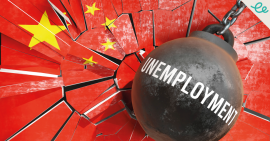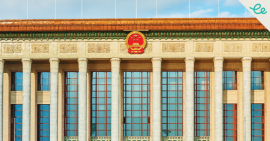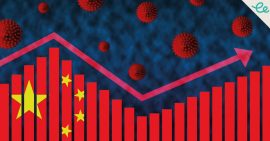What to expect from the rest of the “Two Sessions” (March 4-13)
Who forgot to stop the smog? For such a choreographed show as China’s brief legislative session, Beijing’s air quality was surprisingly poor on Sunday. The annual meeting kicked off amid the worst air quality in at least a decade. But inside the Great Hall of the People, the Party-state had plenty of positive data to showcase and officials are plotting the recovery of the world’s second largest economy, freed from the shackles of zero-Covid controls.
The “Two Sessions” now underway, from March 4 to 13, comprise the “parliament” (NPC) and the top advisory body (CPPCC). Despite their performative nature, and lack of opposition voices, this twin event always serves up plenty of interest. Especially this year, the start of another five-year political cycle, following October’s Party Congress, when Xi Jinping’s new economic team will be appointed.
Li’s swansong
China’s economic message was decidedly underwhelming on Sunday, when outgoing Premier Li Keqiang offered few clues about economic policies in 2023. Li, 67, delivered his tenth and final Government Work Report, at the close of two five-year terms of being side-lined by Xi, 69 (who took centre stage, naturally).
Li set a modest economic growth target of “around 5%” for 2023, and avoided talk of stimulus measures to alleviate worries over China’s debt pile. Compared with the (missed) 2022 goal (5.5%), this year’s targeted growth will not be too much of a stretch given the sharp deterioration of the economy last year. The modest targets of a 3% budget deficit in 2023 (vs 2.8% in 2022), and Rmb3.8trn of Special Purpose Bonds (SPB), up only a touch from 2022, also do not suggest a substantial stimulus is on the cards.
In bad news for the planet, some other big numbers were missing. The two reports released on Sunday set very few energy or emissions targets for 2023, unlike in previous reports. Scaling up clean energy investment is part of the economic recovery plan, “but there’s no appetite for controlling dirty energy for now,” Tweeted climate expert Lauri Myllyvirta.
On March 10, Xi will be “voted” in for a norm-busting third term as China’s president. Xi broke the traditional but unwritten two-term limit for Party general secretary last autumn when he began his third five-year term. In 2018, he did away with term limits on the presidency, the least important of his three positions of power (commander-in-chief takes second spot).
Lawmakers will also vote that day on the State Council’s institutional reform plan. This is the biggest government reshuffle in a decade as Xi tightens the Party’s grip on economic management. Expect increased Party involvement in private enterprises, reported the FT, and a possible super committee overseeing the central bank and other financial regulators.
A new central bank governor and other top jobs will be confirmed on March 11-12, including the next premier Li Qiang, 63, a close Xi ally likely to have greater sway over policymaking than his predecessor and near namesake Li Keqiang. Reuters reported that China’s next No.2 persuaded Xi to re-open China, and end zero-Covid, at a faster pace than Xi intended. See him in action at the (mostly scripted) press conference on March 13.
But just how open will China prove with every major job held by loyal allies of Xi? The macro planner (NDRC) insisted on Sunday that in 2022, China “remained committed to opening up wider to the world and expanded international economic and trade cooperation to deliver mutually beneficial outcomes.” Li claimed that China would up the ante in “intensifying efforts to attract [and] utilise foreign investment.”
After three years of closed borders, local Chinese governments are busy with a charm offensive of exporter delegations to trade shows worldwide, while many foreign business folk are hungry to return to mainland China. Others urge caution, including billionaire investor Mark Mobius who complained he can’t get his money due to Beijing’s capital controls. Be “very, very careful” about investing in China, he warned.
“The bottom line is that China is moving in a completely different direction than what Deng Xiaoping instituted when they started the big reform programme,” he said. “Now you have a government which is taking golden shares in companies all over China. That means they’re going to try to control all of these companies,” said the self-styled “Indiana Jones of emerging market investing”, who is increasing exposure to alternative markets such as India and Brazil.
International schools, especially British, are also looking elsewhere, including India, Nigeria and Japan, after Covid-19 restrictions and clampdowns on foreign education since 2021 stalled a boom in expansion in China.
Foreign Minister Qin Gang held a combative press conference on March 7, warning of “conflict and confrontation” with the USA, and maintaining Beijing’s support for Russia. That stance has extended the “new Cold War” into space. Officials said last month China would soon start training foreign astronauts for trips to newly completed space station Tiangong. But the head of the European Space Agency has said it no longer intends to send European astronauts there (while NASA is barred by law from most interactions with the Chinese programme).
With the US stepping up restrictions on Chinese access to sensitive tech, Xi is reinforcing the urgent need for tech self-sufficiency. Speeding up efforts to achieve greater self-reliance and strength in science and technology is the path China must take to advance high-quality development, Xi told the Jiangsu provincial delegation on Sunday, in his first public comments at the Two Sessions. (Fun fact: this year, Xi came as a Jiangsu deputy – his “unanimous election won thunderous applause” in January.)
Related Articles:
Post-Covid China Banks on Economic Recovery After Lunar New Year Holiday
China After COVID: Joining Us in the Studio Tonight We Have…








Comments are closed.